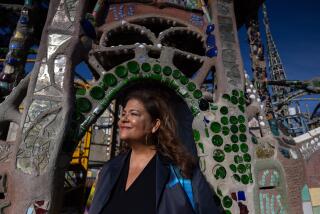Woman Helps to Preserve History
- Share via
To preserve history, one must first save the paper it is written on, and Jane Mueller, a preservation librarian, is an expert in that lonely field.
“People don’t understand that there are things that can be done to preserve those important documents,” said the Buena Park woman, who has mastered the fine art of paper preservation.
With modern methods, paper can be preserved indefinitely, Mueller said.
She has shown others how it works in two free paper preservation workshops held at the Fullerton Library in August and earlier this month.
She may hold more.
“It appears there is somewhat of a resurgence of history keeping, and people are holding it intact by preserving it whether the material is a family document, a news clipping or grandfather’s scrapbook,” she said.
She demonstrated how to relax, de-acidify, clean and encapsulate paper and photographs by wrapping them with tape and polyester plastic.
Older methods--such as gluing keepsakes to newspapers that are bound with shoelaces--are sometimes successful, Mueller said, although archaic.
“A lot of those papers were then stored in old chests,” keeping out moisture and air, she said.
“I want the public to know that someone cares about their documents,” said the one-time seamstress.
Mueller attended Cypress College and Cal State Fullerton, earning a degree after 12 years.
“I was also raising children and had a house and husband to take care of,” she explained.
Because few firms handle small jobs, most document preservation occurs at home, Mueller said.
While history has always been her interest, Mueller’s work with the Santiago Library System Heritage Project “is really where it all started.”
She developed a computer database there of Southern California local history collections.
But before that, “I liked working with my hands, and that included making paper,” said the former fourth-grade substitute schoolteacher.
“I really enjoyed teaching and remember saying to myself, ‘Gosh, I don’t know what they are paying me for.’ ”
But she also enjoyed working with paper and finding a way to preserve history.
“I think I was past 40 before I really got fully interested in history,” said Mueller, 60. “I guess it takes time for people to acquire that interest.”
Tape-recorded oral histories are another way to permanently store historical keepsakes. “When you have a recording of a voice it provides you with a better sense of history and time by hearing the actual voice,” Mueller said.
More to Read
Sign up for Essential California
The most important California stories and recommendations in your inbox every morning.
You may occasionally receive promotional content from the Los Angeles Times.













